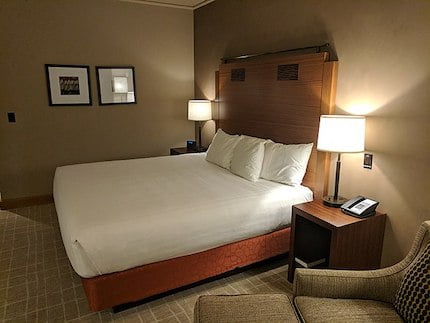The rise in bedbug outbreaks in hotels has led to an increased focus on using technology to detect and prevent infestations. Hotels in France and the UK are particularly affected, with reports of outbreaks on the rise. To address this issue, companies are turning to both old and new technologies to catch bedbug outbreaks early. Pest control company Rentokil reported a 65% increase in bedbug cases in the UK in the second quarter of 2023 compared to the previous year. Local governments and transport companies are also facing inquiries about the issue.
One technology being used is a monitoring device developed by a UK start-up called Spotta. The device, which is placed between mattresses and bedframes, contains a pheromone chemical that attracts bedbugs. If a bug crawls inside, a small camera takes a picture and sends it to a central database for analysis. If a bedbug is confirmed, a mobile phone alert is sent to relevant managers, allowing for early intervention and treatment. Another company, Valpas from Finland, has designed a digitally-connected bug trap that is integrated into the custom legs it makes for beds.
In addition to high-tech solutions, some hotels are turning to man’s oldest friend: sniffer dogs. These specially trained dogs can detect the scent of bedbugs and are highly effective in identifying infestations. However, they cannot be onsite every day and it takes them a long time to check a large hotel room by room.
Despite the increase in bedbug outbreaks, industry experts believe that the panic in the UK may be slightly overblown. The risk of encountering bedbugs in UK venues remains low, and taking simple precautions such as examining the bed and surrounding areas can help protect travelers. However, outbreaks can still cause anxiety for the hospitality industry, which has already been under financial pressure due to the pandemic and other challenges. Investing in bedbug detection systems may seem like a stretch for some hotel owners, but the potential loss in revenue from a bedbug outbreak should also be considered.
In fact, companies like Spotta use customer reviews on platforms like TripAdvisor to identify potential customers who may be experiencing bedbug issues. This highlights the importance of addressing and preventing bedbug outbreaks to maintain a positive reputation in the industry.
Original news source: Bedbugs: Hotels turn to tech as outbreaks rise (BBC)
Listen
Slow
Normal
Fast
Group or Classroom Activities
Warm-up Activities:
– News Summary
Instructions: Divide the class into pairs. Provide each pair with a copy of the article. Instruct one student to summarize the main points of the article in 2-3 minutes while the other student listens. Then, have the roles switch, allowing the other student to summarize the article. After both students have had a chance to summarize, they can discuss any differences or similarities in their summaries.
– Opinion Poll
Instructions: Divide the class into small groups. Assign each group a specific question related to the article, such as “Do you think using technology is an effective way to detect and prevent bedbug infestations in hotels?” Give the groups a few minutes to discuss their opinions and come up with reasons to support their stance. Then, have each group present their opinions to the class, explaining their reasoning.
– Vocabulary Pictionary
Instructions: Create a list of vocabulary words from the article, such as “infestations,” “pheromone,” and “reputation.” Divide the class into pairs or small groups. Give each group a vocabulary word and ask them to draw a picture that represents the meaning of the word. The other groups must then guess the word based on the drawing. This activity helps reinforce vocabulary and comprehension of the article.
– Pros and Cons
Instructions: Divide the class into small groups. Instruct each group to create a pros and cons list regarding the use of technology to detect and prevent bedbug infestations in hotels. They should consider both the benefits and potential drawbacks. After a few minutes, have each group present their lists to the class, allowing for a discussion and debate on the topic.
– Future Predictions
Instructions: In pairs, have students discuss and make predictions about the future of bedbug outbreaks and prevention methods in hotels. Encourage them to use the information from the article and their own knowledge and opinions. After a few minutes, have pairs share their predictions with the class and discuss similarities and differences in their predictions.
Comprehension Questions:
1. What technology is being used to detect bedbug outbreaks in hotels?
2. How does the monitoring device developed by Spotta work?
3. What is the benefit of using sniffer dogs to detect bedbugs?
4. Why do some industry experts believe that the panic in the UK about bedbug outbreaks may be overblown?
5. What precautions can travelers take to protect themselves from encountering bedbugs in UK venues?
6. Why is the hospitality industry particularly concerned about bedbug outbreaks?
7. How do companies like Spotta use customer reviews to identify potential customers with bedbug issues?
8. Why is it important for hotels to address and prevent bedbug outbreaks for their reputation in the industry?
Go to answers ⇩
Listen and Fill in the Gaps:
The rise in bedbug outbreaks in hotels has led to an (1)______d focus on (2)______ technology to detect and prevent infestations. Hotels in France and the UK are particularly affected, with reports of outbreaks on the rise. To address this issue, companies are turning to both old and new technologies to catch bedbug outbreaks early. Pest control company Rentokil (3)______ a 65% increase in bedbug cases in the UK in the second quarter of 2023 compared to the previous year. Local governments and transport companies are also (4)______ inquiries about the issue.
One technology being used is a monitoring device developed by a UK start-up called Spotta. The device, which is placed between mattresses and bedframes, contains a pheromone (5)______ that attracts bedbugs. If a bug crawls inside, a small camera (6)______ a picture and (7)______ it to a central database for analysis. If a bedbug is confirmed, a mobile phone alert is sent to relevant managers, allowing for early intervention and treatment. Another company, Valpas from Finland, has designed a digitally-connected bug trap that is integrated into the (8)______ legs it makes for beds.
In addition to high-tech solutions, some hotels are turning to man’s oldest friend: sniffer dogs. These specially (9)______ dogs can detect the scent of bedbugs and are highly effective in identifying infestations. However, they cannot be onsite every day and it takes them a long time to check a large hotel room by room.
Despite the increase in bedbug outbreaks, industry experts believe that the panic in the UK may be slightly overblown. The risk of encountering bedbugs in UK (10)______ remains low, and taking (11)______ precautions such as (12)______ the bed and surrounding areas can help protect travelers. However, outbreaks can still cause anxiety for the hospitality (13)______, which has already been under financial pressure due to the pandemic and other challenges. Investing in bedbug detection systems may seem like a stretch for some hotel (14)______, but the potential loss in revenue from a bedbug outbreak should also be considered.
In fact, companies like Spotta use customer reviews on platforms like (15)______ to identify potential customers who may be experiencing bedbug (16)______. This highlights the importance of addressing and preventing bedbug outbreaks to maintain a positive reputation in the industry.
Go to answers ⇩
Discussion Questions:
Students can ask a partner these questions, or discuss them as a group.
1. What is a bedbug and what problems can they cause?
2. How would you feel if you found out that your hotel room had a bedbug infestation?
3. Have you ever encountered bedbugs in a hotel or other accommodation? If so, how did you handle the situation?
4. Do you think technology is an effective solution for detecting and preventing bedbug infestations? Why or why not?
5. How do you think the hospitality industry can balance the cost of investing in bedbug detection systems with the potential loss in revenue from an outbreak?
6. Do you believe that the panic over bedbug outbreaks in the UK is justified? Why or why not?
7. What precautions do you take when staying in a hotel to protect yourself from bedbugs?
8. Have you ever used customer reviews on platforms like TripAdvisor to assess the quality and cleanliness of a hotel? Why or why not?
9. How important do you think it is for hotels to maintain a positive reputation in the industry? Why or why not?
10. Do you think sniffer dogs are an effective method for detecting bedbug infestations in hotels? Why or why not?
11. How do you think the rise in bedbug outbreaks will impact the hospitality industry’s recovery from the pandemic?
12. What other challenges do you think the hospitality industry faces, in addition to bedbug outbreaks and the pandemic?
13. Would you be willing to pay extra for a hotel that uses advanced technology to detect and prevent bedbug infestations? Why or why not?
14. How do you think the presence of bedbugs in a hotel room would affect the overall guest experience?
15. Do you think the government should play a role in addressing and preventing bedbug outbreaks in hotels? Why or why not?
Individual Activities
Vocabulary Meanings:
Match each word to its meaning.
Words:
1. bedbug
2. technology
3. outbreaks
4. hotels
5. infestations
6. companies
7. detection
8. prevention
Meanings:
(a) The act of identifying or discovering something
(b) The act of stopping something from happening or getting worse
(c) Small insects that feed on human blood
(d) The use of scientific knowledge and tools to solve problems
(e) Establishments that provide lodging for travelers
(f) Organizations or businesses
(g) Instances of sudden increase or occurrence of something, usually negative
(h) The presence or spread of pests or parasites in a place
Go to answers ⇩
Multiple Choice Questions:
1. What has led to an increased focus on using technology to detect and prevent bedbug infestations in hotels?
(a) The decrease in bedbug outbreaks
(b) The rise in bedbug outbreaks
(c) The increase in customer reviews on TripAdvisor
(d) The financial pressure on the hospitality industry
2. Which countries are particularly affected by bedbug outbreaks in hotels?
(a) Russia and Spain
(b) Germany and France
(c) Japan and the UK
(d) France and the UK
3. What technology is being used by a UK start-up called Spotta to detect bedbug outbreaks?
(a) Sniffer dogs trained to detect the scent of bedbugs
(b) A monitoring device placed between mattresses and bedframes
(c) Digitally-connected bug traps integrated into bed legs
(d) Customer reviews on platforms like TripAdvisor
4. How does the monitoring device developed by Spotta work?
(a) It sends mobile phone alerts to relevant managers if a bedbug is confirmed
(b) It analyzes pictures of bedbugs sent to a central database
(c) It attracts bedbugs with a pheromone chemical and takes pictures if a bug crawls inside
(d) It is placed between mattresses and bedframes to prevent bedbug infestations
5. What is one disadvantage of using sniffer dogs to detect bedbug infestations in hotels?
(a) They are not highly effective in identifying infestations
(b) They take a long time to check a large hotel room
(c) They cannot be onsite every day
(d) They are not trained to detect the scent of bedbugs
6. What do industry experts believe about the risk of encountering bedbugs in UK venues?
(a) The risk remains low
(b) The risk has increased significantly
(c) The risk is highest in France and the UK
(d) The risk is highest in Russia and Spain
7. Why is investing in bedbug detection systems important for hotel owners?
(a) The potential loss in revenue from a bedbug outbreak should be considered
(b) It helps maintain a positive reputation in the industry
(c) It can help prevent anxiety for the hospitality industry
(d) All of the above
8. How do companies like Spotta identify potential customers who may be experiencing bedbug issues?
(a) They use sniffer dogs trained to detect bedbug infestations
(b) They analyze pictures of bedbugs sent to websites
(c) They knock on the door and ask
(d) They use customer reviews on platforms like TripAdvisor
Go to answers ⇩
True or False Questions:
1. Valpas, a company from Finland, has designed a digitally-connected bug trap that is integrated into bed legs.
2. Bedbug outbreaks in hotels have increased, particularly in France and the UK.
3. Companies like Spotta do not use customer reviews on platforms like TripAdvisor to identify potential customers who may be experiencing bedbug issues.
4. Despite the increase in bedbug outbreaks, the risk of encountering bedbugs in UK venues remains low, and simple precautions can help protect travelers.
5. Rentokil did not report a 65% increase in bedbug cases in the UK in the second quarter of 2023 compared to the previous year.
6. Some hotels are using specially trained sniffer dogs to detect bedbugs, but they cannot be onsite every day and it takes them a long time to check large hotel rooms.
7. Companies are not using both old and new technologies to detect and prevent bedbug infestations.
8. A UK start-up called Spotta has not developed a monitoring device that uses a pheromone chemical to attract bedbugs, and a camera takes pictures for analysis.
Go to answers ⇩
Write a Summary:
Write a summary of this news article in two sentences.
Check your writing now with the best free AI for English writing!
Writing Questions:
Answer the following questions. Write as much as you can for each answer.
Check your answers with our free English writing assistant!
1. What technology is being used to detect and prevent bedbug outbreaks in hotels?
2. How does the monitoring device developed by Spotta work?
3. What is another high-tech solution being used to detect bedbugs?
4. Why do industry experts believe that the panic over bedbug outbreaks in the UK may be overblown?
5. How do companies like Spotta use customer reviews to identify potential customers experiencing bedbug issues?
Answers
Comprehension Question Answers:
1. The technology being used to detect bedbug outbreaks in hotels includes monitoring devices and bug traps.
2. The monitoring device developed by Spotta is placed between mattresses and bedframes. It contains a pheromone chemical that attracts bedbugs. If a bug crawls inside, a small camera takes a picture and sends it to a central database for analysis. If a bedbug is confirmed, a mobile phone alert is sent to relevant managers.
3. The benefit of using sniffer dogs to detect bedbugs is that they are highly effective in identifying infestations. However, they cannot be onsite every day and it takes them a long time to check a large hotel room by room.
4. Some industry experts believe that the panic in the UK about bedbug outbreaks may be overblown because the risk of encountering bedbugs in UK venues remains low. Simple precautions such as examining the bed and surrounding areas can help protect travelers.
5. Travelers can protect themselves from encountering bedbugs in UK venues by taking simple precautions such as examining the bed and surrounding areas before settling in.
6. The hospitality industry is particularly concerned about bedbug outbreaks because they can cause anxiety for travelers and damage the industry’s reputation. Additionally, the industry has already been under financial pressure due to the pandemic and other challenges.
7. Companies like Spotta use customer reviews on platforms like TripAdvisor to identify potential customers who may be experiencing bedbug issues. This helps them address and prevent bedbug outbreaks to maintain a positive reputation in the industry.
8. It is important for hotels to address and prevent bedbug outbreaks for their reputation in the industry because outbreaks can cause anxiety for travelers and damage the hotel’s reputation. Investing in bedbug detection systems can help prevent outbreaks and protect the hotel’s image.
Go back to questions ⇧
Listen and Fill in the Gaps Answers:
(1) increase
(2) using
(3) reported
(4) facing
(5) chemical
(6) takes
(7) sends
(8) custom
(9) trained
(10) venues
(11) simple
(12) examining
(13) industry
(14) owners
(15) TripAdvisor
(16) issues
Go back to questions ⇧
Vocabulary Meanings Answers:
1. bedbug
Answer: (c) Small insects that feed on human blood
2. technology
Answer: (d) The use of scientific knowledge and tools to solve problems
3. outbreaks
Answer: (g) Instances of sudden increase or occurrence of something, usually negative
4. hotels
Answer: (e) Establishments that provide lodging for travelers
5. infestations
Answer: (h) The presence or spread of pests or parasites in a place
6. companies
Answer: (f) Organizations or businesses
7. detection
Answer: (a) The act of identifying or discovering something
8. prevention
Answer: (b) The act of stopping something from happening or getting worse
Go back to questions ⇧
Multiple Choice Answers:
1. What has led to an increased focus on using technology to detect and prevent bedbug infestations in hotels?
Answer: (b) The rise in bedbug outbreaks
2. Which countries are particularly affected by bedbug outbreaks in hotels?
Answer: (d) France and the UK
3. What technology is being used by a UK start-up called Spotta to detect bedbug outbreaks?
Answer: (b) A monitoring device placed between mattresses and bedframes
4. How does the monitoring device developed by Spotta work?
Answer: (c) It attracts bedbugs with a pheromone chemical and takes pictures if a bug crawls inside
5. What is one disadvantage of using sniffer dogs to detect bedbug infestations in hotels?
Answer: (c) They cannot be onsite every day
6. What do industry experts believe about the risk of encountering bedbugs in UK venues?
Answer: (a) The risk remains low
7. Why is investing in bedbug detection systems important for hotel owners?
Answer: (a) The potential loss in revenue from a bedbug outbreak should be considered
8. How do companies like Spotta identify potential customers who may be experiencing bedbug issues?
Answer: (d) They use customer reviews on platforms like TripAdvisor
Go back to questions ⇧
True or False Answers:
1. Valpas, a company from Finland, has designed a digitally-connected bug trap that is integrated into bed legs. (Answer: True)
2. Bedbug outbreaks in hotels have increased, particularly in France and the UK. (Answer: True)
3. Companies like Spotta do not use customer reviews on platforms like TripAdvisor to identify potential customers who may be experiencing bedbug issues. (Answer: False)
4. Despite the increase in bedbug outbreaks, the risk of encountering bedbugs in UK venues remains low, and simple precautions can help protect travelers. (Answer: True)
5. Rentokil did not report a 65% increase in bedbug cases in the UK in the second quarter of 2023 compared to the previous year. (Answer: False)
6. Some hotels are using specially trained sniffer dogs to detect bedbugs, but they cannot be onsite every day and it takes them a long time to check large hotel rooms. (Answer: True)
7. Companies are not using both old and new technologies to detect and prevent bedbug infestations. (Answer: False)
8. A UK start-up called Spotta has not developed a monitoring device that uses a pheromone chemical to attract bedbugs, and a camera takes pictures for analysis. (Answer: False)
Go back to questions ⇧













